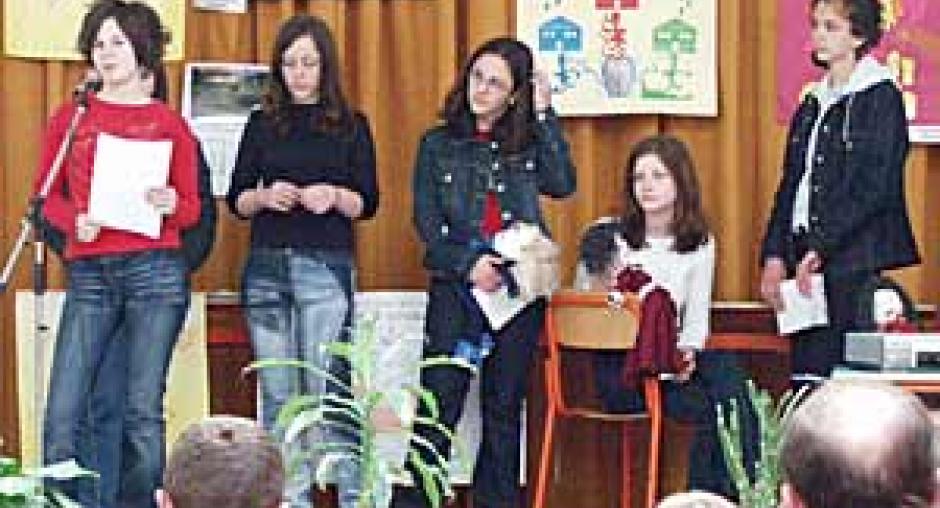Newsroom
OSCE welcomes agreement of Bosnia and Herzegovina's education ministers to reform 2003-2004 school curriculum
SARAJEVO 5 June 2003

Education reform is a top priority of the OSCE Mission to Bosnia and Herzegovina. (OSCE) Photo details
SARAJEVO, 5 June 2003 - The OSCE Mission to Bosnia and Herzegovina today welcomed the signing in Banja Luka of an agreement to implement a common curriculum throughout the country.
Ministers of education from Bosnia and Herzegovina's two entities - the Federation and Republika Srpska - and the Federation cantons signed a memorandum of understanding on the Common Core Curriculum Steering Board and Subject Specific Working Groups, with which they reiterated their commitment to implement a Common Core Curriculum to the maximum extent possible throughout the country by the start of the next school year in September.
"Yesterday's meeting was a significant one", said Ambassador Henry Zipper de Fabiani, Deputy Head of the OSCE Mission. "It helped to clearly define what precise steps need to be taken over the next couple of months in order for the education authorities of Bosnia and Herzegovina to deliver on the commitments they made to the students, parents and teachers in time for the new school year.
"The summer recess will be a busy time for those working in education reform. But the children of Bosnia and Herzegovina must see substantial progress in September," he added.
The Common Core Curriculum will provide increased access and mobility for all students to schools across the country and a common foundation for the further modernization of the education system. These commitments are in accordance with the Education Reform Strategy endorsed by the Peace Implementation Council in Brussels last November.
In preparation for a review of education reform at the Peace Implementation Council in Sarajevo next week, education ministers reviewed progress on the draft state-level framework laws on primary and secondary education and on higher education. Passage and implementation of these laws are post-admission conditions for membership of the Council of Europe and will hasten the development of educational standards and norms in line with those of the rest of Europe.
Education ministers also received an update on preliminary statistics on implementation of the Interim Agreement on education of returnee children. They agreed on the need for concentrated efforts by ministry and school authorities to further increase the number of returnee children and teachers in schools and to end the phenomenon of bussing of children to schools outside their area of return.
The ministers agreed that ministry officials must also focus their efforts this summer on taking the first step towards full legal and administrative unification of 52 existing "two schools under one roof" in cantons where this phenomenon continues to divide children and create inefficiencies in the education system.
Ministers of education from Bosnia and Herzegovina's two entities - the Federation and Republika Srpska - and the Federation cantons signed a memorandum of understanding on the Common Core Curriculum Steering Board and Subject Specific Working Groups, with which they reiterated their commitment to implement a Common Core Curriculum to the maximum extent possible throughout the country by the start of the next school year in September.
"Yesterday's meeting was a significant one", said Ambassador Henry Zipper de Fabiani, Deputy Head of the OSCE Mission. "It helped to clearly define what precise steps need to be taken over the next couple of months in order for the education authorities of Bosnia and Herzegovina to deliver on the commitments they made to the students, parents and teachers in time for the new school year.
"The summer recess will be a busy time for those working in education reform. But the children of Bosnia and Herzegovina must see substantial progress in September," he added.
The Common Core Curriculum will provide increased access and mobility for all students to schools across the country and a common foundation for the further modernization of the education system. These commitments are in accordance with the Education Reform Strategy endorsed by the Peace Implementation Council in Brussels last November.
In preparation for a review of education reform at the Peace Implementation Council in Sarajevo next week, education ministers reviewed progress on the draft state-level framework laws on primary and secondary education and on higher education. Passage and implementation of these laws are post-admission conditions for membership of the Council of Europe and will hasten the development of educational standards and norms in line with those of the rest of Europe.
Education ministers also received an update on preliminary statistics on implementation of the Interim Agreement on education of returnee children. They agreed on the need for concentrated efforts by ministry and school authorities to further increase the number of returnee children and teachers in schools and to end the phenomenon of bussing of children to schools outside their area of return.
The ministers agreed that ministry officials must also focus their efforts this summer on taking the first step towards full legal and administrative unification of 52 existing "two schools under one roof" in cantons where this phenomenon continues to divide children and create inefficiencies in the education system.
